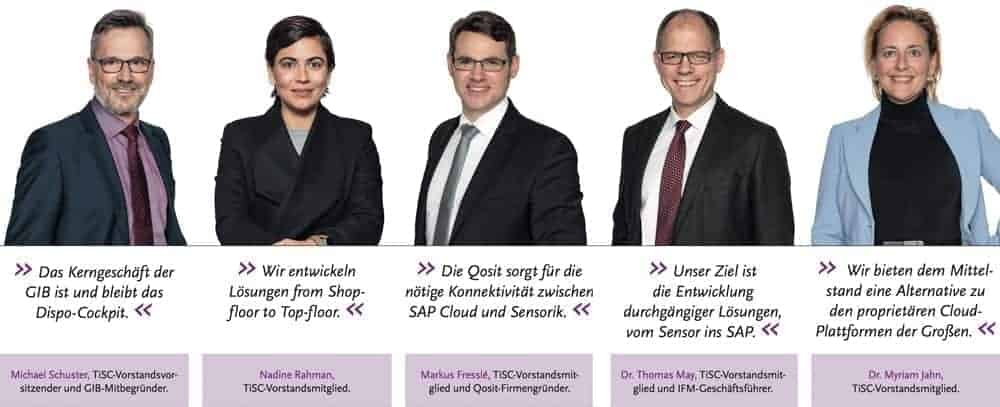From the sensor to SAP
![[shutterstock:566877214, sdecoret]](https://e3mag.com/wp-content/uploads/2017/02/shutterstock_566877214.jpg)

As a founding member, Michael Schuster had wisely steered the fortunes of GIB from the very beginning. For the time after his active management activity, he wished above all for consistency for his GmbH.
The 80 employees were to be secured for the long term and the continued success of the company was to be guaranteed in the future.
"After a long and meticulous search, we finally found the ideal strategic partner for these goals in the IFM Group," says Schuster, summing up the decision-making process for his succession plan.
"With Qosit Informationstechnik GmbH on board, the course into the digital age has finally been set. I now see GIB moving into its internationalized future with peace of mind."
However, he attaches importance to the clarification: "The core business of GIB is and remains the dispo cockpit. The greatest priority is to continue to develop and expand this business."
And not without pride, he adds, "Just recently, TiSC Supervisory Board Chairman Martin Hill called GIB a 'pearl in the construct' with its core product, the GIB Dispo Cockpit."
Schuster's fellow board member Nadine Rahman's vision for the future of TiSC is the realization of long-term customer strategies under the keywords Industry 4.0 and Internet of Things.
"All three companies are pulling in the same direction to achieve this and will continue to expand and internationalize their established product offerings," says Rahman, with a firm eye on the joint future of automation.
"In the coming years, we will accompany our customers step by step on the challenging path to the future of automation," she promises.
"In addition to the day-to-day business, all three companies are joining forces in the background to work on this future and virtually revolutionize from shop-floor to top-floor."
Different partners, common goal
On their joint path into the future, Rahman and Schuster have other innovative minds at their side on the TiSC board. Dr. Thomas May from the leading league of the IFM Group is one of them.
"Our goal is the development and international marketing of end-to-end solutions from the sensor into SAP," he says, describing the joint task of GIB, Qosit and IFM.
The aim is to pave the way to Industry 4.0 for customers. Thomas May holds a doctorate from the Max Planck Institute and has been a member of IFM's management team since 1996.
He sees the merger under the TiSC umbrella as a future success story that he says he would like to look back on with pride in a few years.
The fact that IFM is sending Thomas May to TiSC as an established member of the IFM Executive Board clearly shows the importance the sensor manufacturer attaches to the new AG.
For the further development of the Qosit business, the company founder Markus Fresslé and the managing director of the IFM subsidiary Datalink, Dr. Myriam Jahn, are also on the TiSC board.
Fresslé sees the core competence of Qosit in the service of TiSC AG as being located in Industry 4.0 and says: "Qosit provides the necessary connectivity between SAP Cloud and sensor technology."
A common challenge
The Qosit founder sees the merging of the three very different companies as a demanding challenge with enormous potential. His efforts to develop the company from a classic IT systems house into a high-tech enterprise have been given a breath of fresh air by the new partners.
This message will be communicated to the outside world at the upcoming Hannover Messe. The first joint I 4.0 solutions from the three players will be presented there.
One of these research projects is the topic of energy data management, which is working on a pioneering remote service solution that enables the integration of sensors via remote network in the cloud. We can look forward to the results.
As an expert in the sale of end-to-end solutions from the sensor to the ERP, Jahn also brings the security aspect into the discussion and mentions the crucial question of the Industry 4.0 topic:
"What networks carry the enormous amounts of data and what databases provide comprehensive and secure storage?"
Qosit is designed to answer this question for TiSC.
"Machine data, which is the oil of the 21st century for the industry, can keep medium-sized mechanical engineering companies in Germany on the world stage for a long time to come," says Jahn, "but only if we succeed in making appropriate use of this data."
The entire medium-sized mechanical engineering sector is facing the greatest modern challenge of bringing its portfolio into the digital age. This is only possible with the cloud as a central instance.
"We can offer SMEs a trustworthy and credible alternative to the proprietary cloud platforms of the big players, into whose hands people are reluctant to hand over their 'data treasure'," Jahn continues.
"To my knowledge, there is no other group today that maps the chain from SAP consulting to the sensor in such a complete and integrated way as we do," she adds proudly.
TiSC - The iSolution Company
TiSC consists of three players who have the highest level of expertise in their respective fields and complement each other ideally.
The IFM Group holds 51 percent of TiSC and, as the world market leader for sensor technology, contributes its expertise for collection and forwarding to connected systems.
In this area, there has already been close cooperation with Qosit since 2015. Qosit specializes in the intelligent aggregation of big data into smart data, including secure data transport to the cloud or to connected ERP systems.
At this interface, GIB comes into play as an internationally active manufacturer of software for optimizing SAP-controlled logistics processes.
The company is established in the market of system-driven supply chain management and has extensive expertise, which is reflected in more than ten years of SAP consulting know-how and over 10,000 satisfied users worldwide.






